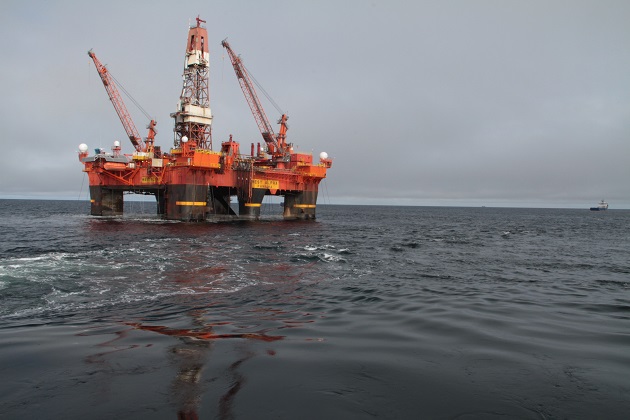The Kremlin is thinking of giving majority control of major oil fields to Chinese investors in order to develop energy reserves
Russia may consider allowing Chinese investors more than 50% stake in its strategic oil and gas fields, an official said last Friday to The Moscow Times. The decision, a complete change in previous policy, highlights Moscow’s need for foreign investment in order to continue developing its aging oil and gas infrastructure.
In the past, Russia guarded control of its major oil fields, which represent the lifeblood of the Russian economy. Russian companies forged some alliances with Western companies in order to obtain the know-how needed to tap resources that are technically challenging to reach, like those in the Arctic, but was forced to stop once sanctions were imposed. Earlier this year, ExxonMobil (ticker: XOM) halted cooperation with Russia’s Rosneft (ticker: RNFTF) in the Kara Sea, depriving Rosneft of resources it needed in order to continue operations.
Since being cut off from Western investment by sanctions, Russia has overcome a “psychological barrier” and is ready to deepen ties with China, according to Deputy Prime Minister Arkady Dvorkovich. “Now we know China better: their motives and intentions are understood,” he told a conference in the Siberian city of Krasnoyarsk.
“There used to be a psychological barrier. Now it doesn’t exist anymore,” he said. “We are interested in maximum investments in new industries. China is an obvious investor for us.”
The shift East
The move towards greater Chinese control of Russian oil and gas assets is part of Russia’s shift towards Asian markets since the implementations of sanctions. Despite the concerted effort to more towards Eastern markets, Asian investors are still wary of buying into Russia. “If you expect us to rush in and do everything the European and American banks can’t do any more, you will be disappointed,” a Bank of China official in Moscow was quoted as saying in October.
Despite the leeriness of some Chinese investors, there has been a limited amount of investment from China in Russia. “It has been very difficult for CNPC (China National Petroleum Corporation) to do upstream cooperation in Russia under Putin,” said a senior Chinese oil industry official familiar with CNPC’s strategy and Sino-Russian energy cooperation. “We have tried numerous times before, but to no avail. Now the situation has changed, the chance of doing that is higher.”
Current restrictions allow foreign investors to own no more than 50% of oil fields with reserves of more than 70 million tons and gas fields with more than 50 billion cubic meters. Dvorkovich said that 50-50 ownership is “comfortable” for now, but added that “if there is a request [for control], we will consider it.” The Deputy Prime Minister said Russia had not yet decided whether to let Chinese investors take stakes in offshore oil and gas deposits.
Kremlin looks to draw on reserve fund in order to support the budget
In addition to seeking increased investment from China in order to support the oil and gas industry, the Russian government has been forced to increase the amount it plans to withdraw from its reserve fund in order to support the overall state budget, reports The Wall Street Journal.
First Deputy Finance Minister Tatiana Nesterenko said that the authorization to draw from the fund would have to be raised to 3.2 trillion rubles (about $52.3 billion) from the original expectation in mid-January of 500 billion rubles (about $8.17 billion). The 3.2 trillion rubles represents more than half the overall value of the fund.
Without the use of the reserve fund, the 2015 budget deficit could reach 4.7% of GDP, compared to around 1% in 2014. The risk of rapid depletion of Russia’s reserves was one of the key reasons behind a decision by Moody’s Investors Service downgrading the country’s rating to junk. The Kremlin has also cut spending by ministries and salaries for workers in the Kremlin by 10% in order to reduce the deficit.
Important disclosures: The information provided herein is believed to be reliable; however, EnerCom, Inc. makes no representation or warranty as to its completeness or accuracy. EnerCom’s conclusions are based upon information gathered from sources deemed to be reliable. This note is not intended as an offer or solicitation for the purchase or sale of any security or financial instrument of any company mentioned in this note. This note was prepared for general circulation and does not provide investment recommendations specific to individual investors. All readers of the note must make their own investment decisions based upon their specific investment objectives and financial situation utilizing their own financial advisors as they deem necessary. Investors should consider a company’s entire financial and operational structure in making any investment decisions. Past performance of any company discussed in this note should not be taken as an indication or guarantee of future results. EnerCom is a multi-disciplined management consulting services firm that regularly intends to seek business, or currently may be undertaking business, with companies covered on Oil & Gas 360®, and thereby seeks to receive compensation from these companies for its services. In addition, EnerCom, or its principals or employees, may have an economic interest in any of these companies. As a result, readers of EnerCom’s Oil & Gas 360® should be aware that the firm may have a conflict of interest that could affect the objectivity of this note. The company or companies covered in this note did not review the note prior to publication.


